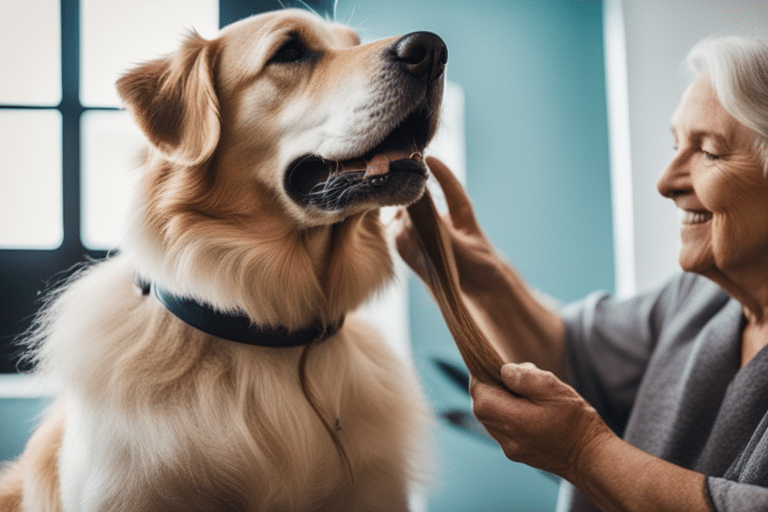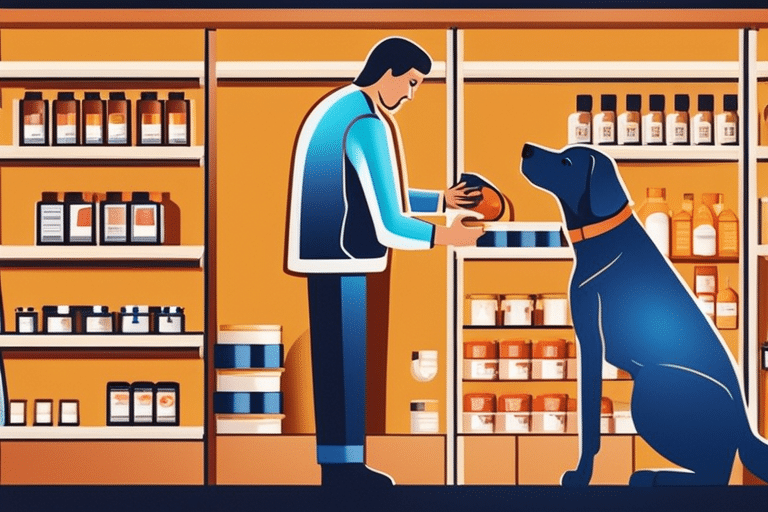

As our canine companions age, their needs evolve, and providing appropriate care becomes increasingly crucial. The overall goal of senior dog care is to ensure our furry friends enjoy a comfortable and healthy old age. This involves understanding and addressing their changing needs, including their dietary and nutritional requirements, potential health issues, and adjustments in their activity level.

Importance of Senior Dog Care
Senior dog care is of utmost importance as it directly impacts the quality of life of our aging pets. Just like humans, older dogs require special attention and care to ensure they remain active, happy, and healthy in their later years.
Specific Needs of Older Dogs
Older dogs have specific needs that differ from those of younger dogs. These needs encompass various aspects, including nutrition, exercise, and health monitoring, to ensure they age gracefully and comfortably.
Changes in Activity Level
As dogs age, they may experience changes in their activity levels. While some may become less active, others may require modifications to their exercise routines to accommodate any mobility issues.
Dietary Requirements
Older dogs often require adjustments to their diet to support their changing nutritional needs. This includes providing supplements to address any deficiencies and support their overall health.
Potential Health Issues
Senior dogs are more susceptible to certain health issues, such as arthritis, joint pain, and reduced mobility. Understanding these potential health concerns is crucial in providing comprehensive care for aging pets.
Understanding the Nutritional Needs of Senior Dogs
To ensure the well-being of our senior dogs, it is essential to understand their specific nutritional requirements and the role of supplements in meeting those needs.
Specific Nutritional Requirements
Older dogs require a balanced diet that meets their specific nutritional needs, including higher levels of certain vitamins and minerals to support their aging bodies.
Higher Levels of Certain Vitamins and Minerals
Supplements play a vital role in ensuring that older dogs receive higher levels of essential vitamins and minerals, such as vitamin D, glucosamine, and omega-3 fatty acids, to support their overall health and well-being.
Maintaining a Healthy Weight
As dogs age, maintaining a healthy weight becomes increasingly important to prevent obesity-related health issues. Proper nutrition, including the use of supplements, can aid in weight management for senior dogs.
Managing Conditions Such as Arthritis
Older dogs are more prone to conditions like arthritis, which can be managed through appropriate nutrition and the use of specific supplements to support joint health.

Types of Supplements for Old Dogs
Several types of supplements are beneficial for older dogs to support their overall health and address age-related issues.
Joint Support Supplements
Joint support supplements containing ingredients like glucosamine and chondroitin can aid in maintaining joint health and mobility in aging dogs.
Omega-3 Fatty Acids
Omega-3 fatty acids are essential for senior dogs as they support heart health, joint function, and cognitive function.
Glucosamine
Glucosamine is widely used to support joint health and mobility in older dogs, particularly those experiencing arthritis or joint stiffness.
Chondroitin
Chondroitin is often paired with glucosamine to provide comprehensive joint support, particularly for senior dogs with arthritis or joint issues.
Multivitamins
Multivitamins tailored for senior dogs can help address potential nutritional deficiencies and support overall health and well-being.
Probiotics
Probiotics can aid in maintaining a healthy gut microbiome, which is particularly beneficial for senior dogs with digestive issues.
Digestive Enzymes
Digestive enzymes can support the digestive system of older dogs, aiding in the absorption of essential nutrients from their food.
Antioxidants
Antioxidants play a crucial role in supporting the immune system and overall health of senior dogs.
Herbal Supplements
Certain herbal supplements, such as turmeric and green-lipped mussel extract, have been found to have anti-inflammatory properties beneficial for senior dogs.

Benefits and Potential Side Effects of Each Supplement
Each type of supplement offers specific benefits for senior dogs, but it is essential to be aware of potential side effects and interactions with other medications.
| Types of Supplements | Benefits | Potential Side Effects |
|---|---|---|
| Joint Support Supplements | Maintains joint health and mobility | Potential gastrointestinal upset |
| Omega-3 Fatty Acids | Supports heart, joint, and cognitive function | Rarely, potential for delayed blood clotting |
| Glucosamine | Supports joint health and mobility | Rarely, potential for allergic reactions |
| Chondroitin | Provides comprehensive joint support | Rarely, potential for gastrointestinal upset |
| Multivitamins | Addresses potential nutritional deficiencies | Excessive intake may lead to toxicity |
| Probiotics | Maintains a healthy gut microbiome | Potential gastrointestinal upset |
| Digestive Enzymes | Supports the digestive system | Rarely, potential for gastrointestinal upset |
| Antioxidants | Supports the immune system and overall health | Excessive intake may be harmful |
| Herbal Supplements | Anti-inflammatory properties | Potential interactions with medications |

Choosing the Right Supplements for Your Old Dog
Selecting the appropriate supplements for an older dog involves careful consideration of various factors to ensure their safety and effectiveness.
Considerations for Old Dog’s Health Needs
Understanding your old dog’s specific health needs is crucial in determining which supplements will be most beneficial for them.
Existing Medical Conditions
Consider any existing medical conditions your old dog may have, as certain supplements could interact with medications or exacerbate certain health issues.
Potential Interactions with Other Medications
It’s essential to evaluate potential interactions between supplements and any medications your old dog may be taking to avoid adverse effects.
Consultation with a Veterinarian
Consulting with a veterinarian is highly recommended to receive professional guidance on selecting the right supplements for your old dog.
Consultation with a Veterinarian
Veterinary consultation is an integral part of providing the best care for senior dogs, especially when considering the use of supplements.
Importance of Veterinary Consultation
Veterinarians can provide valuable insights into the specific needs of your old dog and offer tailored recommendations for supplements.
Guidance on Discussions with Veterinarian
When consulting with a veterinarian, it’s important to provide comprehensive information about your old dog’s health and any concerns you may have regarding their well-being.
Potential Benefits and Risks of Supplements
Veterinarians can outline the potential benefits and risks of specific supplements based on your old dog’s individual health status and needs.
Gradually introducing supplements and monitoring your old dog’s response is essential to ensure their safety and effectiveness.
Gradual Introduction of Supplements
Introduce one supplement at a time in small doses to monitor how your old dog responds and to identify any adverse reactions.
Tips for Monitoring Response
Observe your old dog for any changes in behavior, appetite, or overall well-being after introducing a new supplement.
Adjusting Dosages as Needed
Based on your old dog’s response, adjust the dosages of supplements as needed and continue monitoring for any changes in their health.
Monitoring the Effects of Supplements
Consistently monitoring the effects of supplements is crucial to ensure they are positively impacting your old dog’s well-being.
Importance of Monitoring Response
Regularly monitoring your old dog’s response to supplements allows for prompt adjustments and ensures their continued well-being.
Signs of Improvement or Adverse Reactions
Look for signs of improvement in your old dog’s overall health, as well as any potential adverse reactions to the supplements.
Adjusting or Discontinuing Certain Supplements
Based on the observed effects, be prepared to adjust or discontinue certain supplements if they are not providing the desired benefits or if adverse reactions occur.
Other Aspects of Senior Dog Care
In addition to supplements, there are other crucial aspects of senior dog care that contribute to their overall well-being and quality of life.
Regular Veterinary Check-ups
Regular veterinary check-ups are essential for monitoring your old dog’s health and addressing any emerging concerns proactively.
Dental Care
Dental care is particularly important for senior dogs, as dental issues can significantly impact their overall health and comfort.
Exercise and Mental Stimulation
Engaging your old dog in appropriate exercise and mental stimulation activities is vital for maintaining their physical and cognitive health.
What Supplements Should My Old Dog Be On?
Determining the specific supplements that are best for your old dog involves a comprehensive understanding of their individual health needs and potential deficiencies.
What Can I Give My Dog for Old Age?
For old age, providing a balanced diet, appropriate exercise, and essential supplements tailored to your dog’s specific needs is crucial for maintaining their health and well-being.
How Can I Improve My Old Dog’s Quality of Life?
Improving your old dog’s quality of life involves a holistic approach encompassing nutrition, exercise, mental stimulation, and appropriate veterinary care.
Should I Give My Senior Dog Probiotics?
Probiotics can offer significant benefits for senior dogs by promoting a healthy gut microbiome, but it’s essential to consult with a veterinarian before introducing them into your dog’s routine.
Case Studies and Testimonials
Real-life examples of old dogs benefiting from specific supplements and testimonials from pet owners and veterinarians can provide valuable insights into the effectiveness of various supplements.
Conclusion
The well-being of our old dogs is a responsibility that requires careful attention to their changing needs and the use of appropriate supplements when necessary.
Key Takeaways
Understanding the nutritional needs of senior dogs and the considerations for choosing supplements are key takeaways for providing optimal care for old dogs.
Importance of Proactive Senior Dog Care
Proactive senior dog care, including the use of supplements, is crucial for ensuring our aging pets lead comfortable and healthy lives.
Use of Supplements When Appropriate
When used thoughtfully and under the guidance of a veterinarian, supplements can play a valuable role in supporting the health and well-being of old dogs.
Additional Resources
For further reading and research on senior dog care and the use of supplements, refer to the following authoritative sources:
- American Kennel Club (AKC)
- The American Society for the Prevention of Cruelty to Animals (ASPCA)
- The American Veterinary Medical Association (AVMA)
Legal Disclaimer
The information provided in this article is for informational purposes only and should not be considered as a substitute for professional veterinary advice. Always consult with a qualified veterinarian for guidance on the health and well-being of your senior dog.
For the question “What supplements should my old dog be on?” the specific supplements that are best for your old dog involve a comprehensive understanding of their individual health needs and potential deficiencies.





